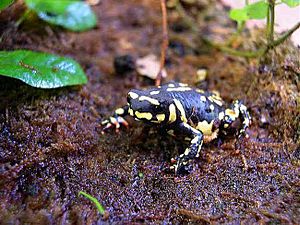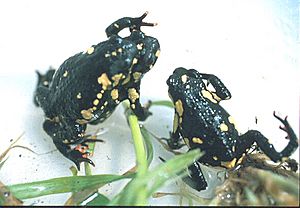Bumble bee toad facts for kids
Quick facts for kids Bumble bee toad |
|
|---|---|
 |
|
| The name bumble bee toad comes from their distinct black and yellow pattern. | |
| Conservation status | |
| Scientific classification |
|
| Kingdom: | Animalia |
| Phylum: | Chordata |
| Class: | Amphibia |
| Order: | Anura |
| Family: | Bufonidae |
| Genus: | Melanophryniscus |
| Species: |
M. stelzneri
|
| Binomial name | |
| Melanophryniscus stelzneri (Weyenbergh, 1875)
|
|
| Script error: The function "autoWithCaption" does not exist. | |
| Synonyms | |
|
|
Script error: No such module "Check for conflicting parameters".
The Melanophryniscus stelzneri, often called the bumble bee toad, is a small and colorful amphibian. It gets its name from its bright black and yellow patterns, which look a lot like a bumble bee! You might also hear it called the redbelly toad or yellow and black walking toad.
This special toad lives in Argentina. It is a type of toad that belongs to the family Bufonidae. Sometimes, these toads are kept as pets.
Contents
Meet the Bumble Bee Toad!
Bumble bee toads are quite small. They usually grow to be about 3.8 centimeters (1.5 inches) long. Female toads are typically a bit bigger than the males.
These toads have very striking colors. Their backs are covered in bold black and yellow patterns. Their bellies are often bright red, which is where the name "redbelly toad" comes from! They also have red toes.
Where Do Bumble Bee Toads Live?
Bumble bee toads were first discovered in a place called Córdoba, Argentina. Today, we know they live in several parts of Argentina, including the provinces of Córdoba, San Luis, and Salta Province. It's possible they might also live in parts of Bolivia.
These toads love to live in grassy areas that have lots of rocks. They can be found in open fields and rocky hillsides.
Reproduction and Habitat
When it's time for them to have babies, bumble bee toads look for water. They lay their eggs in shallow ponds, small streams, or even wet, marshy areas called bogs. Sometimes, you can even find their eggs in puddles along the side of the road!
What Do Bumble Bee Toads Eat?
In the wild, bumble bee toads enjoy a diet of tiny insects. Their favorite foods are mites and ants. They use their sticky tongues to catch these small creatures.
Why Are They So Colorful? (And a Little Bit Toxic!)
The bright colors of the bumble bee toad are not just for show! This bold pattern is a special warning sign to other animals. It tells predators, "Hey, I might not taste very good!" This warning system is called aposematism.
Wild bumble bee toads can be a little bit toxic. This means they have special chemicals in their skin that can make predators feel sick if they try to eat them. Scientists believe these toxins come from the mites and ants that the toads eat. It's like they absorb the chemicals from their food!
If a bumble bee toad is raised in captivity and doesn't eat its natural diet of mites and ants, it usually won't be toxic anymore. This shows how important their diet is to their natural defenses.
Naming the Bumble Bee Toad
The scientific name for this toad is Melanophryniscus stelzneri. The second part of its name, stelzneri, was chosen to honor a German geologist named Alfred Wilhelm Stelzner. He spent some time exploring and studying in Argentina.
Scientists first officially described this species in 1875. There are also two recognized types, or "subspecies," of the bumble bee toad. These are Melanophryniscus stelzneri stelzneri and Melanophryniscus stelzneri spegazzinii.
See also
 In Spanish: Melanophryniscus stelzneri para niños
In Spanish: Melanophryniscus stelzneri para niños
 | Chris Smalls |
 | Fred Hampton |
 | Ralph Abernathy |



